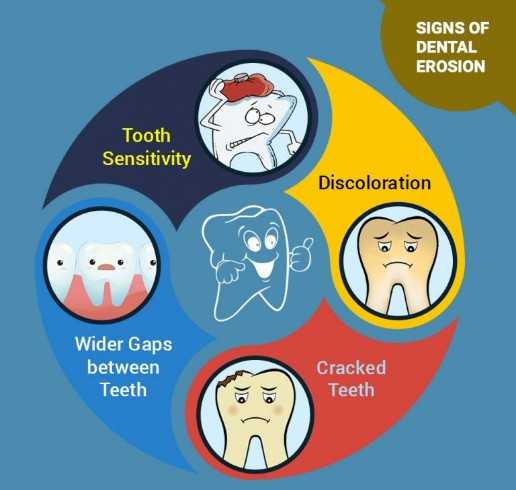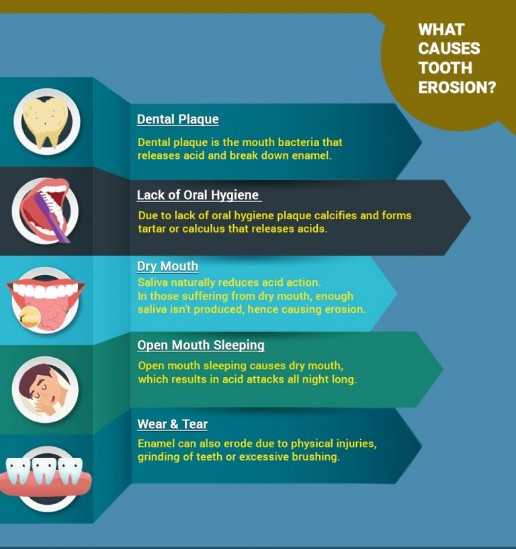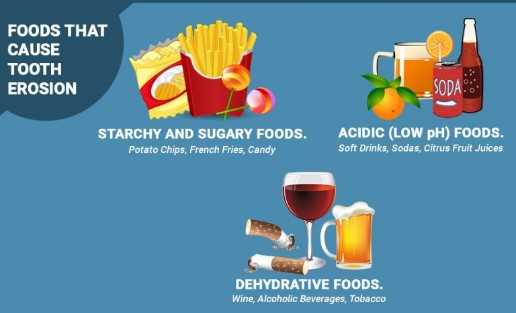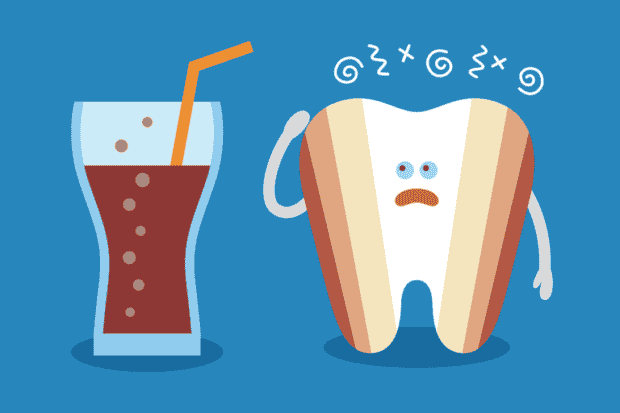What is dental erosion?
Erosion is the loss of tooth enamel caused by the acid attack. Enamel is the hard, defensive coating of the tooth, which protects the sensitive dentine underneath. When the enamel is attacked, the dentine underneath comes to danger, this may lead to pain and sensitivity
How do I know I have dental erosion?
When erosion starts it shows small hollows in the teeth and generally on biting surface or in edges. So the dentine underneath will expose that is a darker and yellower color than the enamel. In this time you may feel sensitive to hot and cold foods as the dentine is the sensitive element.

What causes dental erosion?
Every time you eat or drink anything acidic, the enamel on your teeth becomes softer for a short while and loses some of its mineral content. Your saliva will slowly eliminate the acidic content in your mouth and get it back to its natural balance. However, if this attack is happening too often, your mouth does not get a chance to repair itself and tiny particles of enamel can be brushed away. Over time this leads to loss the surface of your teeth.

Are there any medical reasons which can cause dental erosion?
Bulimia is a condition where patients make themselves sick to lose weight. Because there are high levels of acid in the vomit, this can damage tooth enamel.
Acids produced in the stomach can come up into the mouth (this is called gastro-oesophageal reflux). People who suffer from hiatus hernia or oesophageal problems, or who consume too much alcohol, may also find dental erosion due to vomiting.
Can my diet help prevent dental erosion?
Yes, the food we intake plays an important role in our health. Acidic foods and drinks lead to tooth erosion. The Acidic content in particular food is measured by its ‘pH value’, and anything that has a PH value lower than 5.5 is more acidic and can harm your teeth.

Fizzy drinks can cause erosion. It is important to remember that brands claims as ‘diet brands’ are still harmful. Even flavored fizzy water is also not good when it taken in large amounts, because it contains weak acids which can harm your teeth.
Acidic foods and drinks such as fruit and fruit juices, certainly citrus ones including lemon and orange, contain natural acids which can be harmful to your teeth, especially if you are consuming a lot of them often causes tooth erosion.
‘Alcopop’ drinks that contain acidic fruits and are fizzy can cause erosion too.
Water is the best drink for teeth and health, and milk is also good because it helps to neutralize the acids in your mouth.
How some everyday drinks may erode your teeth:
| Cola drinks | 2.5 | High |
| Carbonated orange | 2.9 | High |
| Grapefruit juice | 3.2 | High |
| White wine | 3.7 | Medium |
| Beer/bitter | 3.9 | Low |
| Lagers | 4.4 | Low |
| Perrier water | 5.1 | Low |
| Buxton still mineral water | 8.1 | Low |
Are sports drinks safe?
The ingredients used in sports drinks can cause dental erosion. However, athletes should avoid dehydration because this can lead to a dry mouth and bad breath
What can I do to prevent dental erosion?
- Limit acidic products and sugary drinks to mealtimes, to reduce the number of acid attacks on your teeth.
- If you are drinking sugary drinks quickly have without ‘swishing’ around your mouth. Or you can use a straw to help drinks go to the back of your mouth and avoid long contact with your teeth.
- Have cheese or milk after a meal as this will help cancel out the acid.
- Chew sugar-free gum after eating. This will help produce more saliva to help to remove the acids which form in your mouth after eating.
- Wait for one hour after having anything acidic before brushing your teeth. This allows your teeth time to build up their mineral content again.
Brush your teeth minimum two minutes twice a day with a small—headed brush with medium to soft bristles and fluoride toothpaste.
Should I use any other special products?
We recommend brushing teeth fluoride toothpaste twice a day. Three years old children should use a toothpaste with a fluoride level of at least 1000ppm (parts per million). Above three years to adults should use a toothpaste that contains 1350ppm to 1500ppm. In severe cases, fluoride supplements such as rinses and gels can be used once a day. Your dentist will advise the best supplement to use.
How can dental erosion be treated?
The treatment is not necessary always you can prevent it with regular check-ups. Your dentist can prevent the problem from the erosion spreading further. Another case is important to protect the tooth and the dentine underneath to prevent sensitivity. In these cases, simply bonding a filling onto the tooth will be enough to repair it. In some condition more severe cases the dentist may need to fit a veneer.
How much will dental erosion treatment cost?
Costs may vary depending on the type of treatment you require.
It is important to discuss all the treatment options with your dentist and get a quotation before starting treatment.





